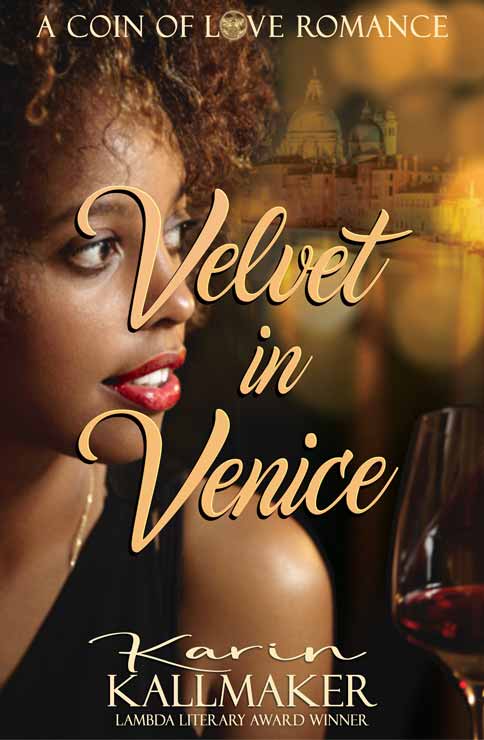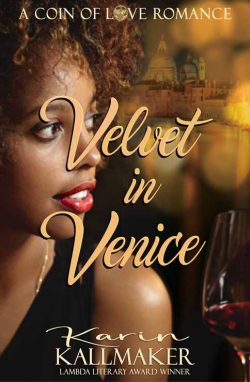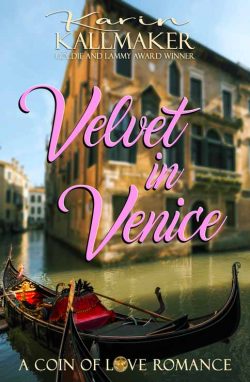Chapter One
“As you can see, there are four distinct colors of marble used in the columns on this section of St. Mark’s Basilica. The marble was brought here from as far away as Constantinople and Alexandria. Imagine not having a truck and moving one of these columns from Los Angeles to Seattle.”
Artie Bryson drew a deep breath, ignored the trickle of humidity-driven sweat at her temple, and directed her group’s attention to one of the pillars at the grand entrance of the Basilica di San Marco. “The pattern of the marble inlay seems almost chaotic. This Byzantine style seems especially bizarre when compared to the systematic pattern of the Doge’s Palace next door.”
There was another forty minutes to her customized walking tour of Venice, and her family of charges ranged from the parents’ great interest in seeing the “important” sites, the teens’ longing looks at gelato carts and espresso cafés, to the overheated and bored little girl’s clinging. The child’s legs were half as long as everyone else’s so she walked double the steps, and everywhere she turned there was a backpack or elbow aimed at her head. Family dynamics were part of the challenge of being a tour guide in a city with no cars, little shade, and filled beyond capacity with tourists all wanting to see the same sights.
It had been Artie’s long-cherished dream of a daily commute over waterways, bridges, and narrow streets that had been there for seven centuries or more. After five years living the dream, two of those spent in stages of lockdown and deep national grief, she wasn’t springing out of bed with quite the same enthusiasm. And it wasn’t solely because the crowds and humidity of peak summer season were nearly unbearable.
But what else was an American with an almost-doctorate in Italian Literature to do? Her other choices had been the life of an adjunct, cobbling together a living by working at four or five different campuses in a single week. Or, to quote her mother the last time they’d spoken, a “real” job, and do real work for once.
As she continued her well-rehearsed speech — pointing out the contrasting colors of marble, the geometric patterns of inlay, and the variation in the number of leaves and stars throughout, all with their own symbolic meaning in the Byzantine fashion — she reminded herself that she was living alongside Art, capital A.
Perhaps living near Art had made its glory a little less uplifting? At least she was living in Venice, she consoled herself. Every day she took a vaporetto along the Grand Canal, passing buildings that Dante and Titian had also admired. Working the high tourist season from May to September meant that when acqua alta came she could simply stay home, where she was warm, dry, and three floors above the flooding. She could spend six days a week, if she wanted, at the Biblioteca dell’Accademia with a scholar’s access to the original texts, letters, and drafts of the wildly original, scandalous, and vastly talented Veronica Franco, who was the subject of her dissertation.
From la Franco she’d moved onto Dante. She was on her second reading of The Divine Comedy in a sixteenth century handwritten copy, turning the pages with a gloved hand. The birth of the Italian language was at the tip of her fingers.
She waved her group ahead of her as they reached the Ateneo di San Basso, glad to have them all out of the sun. “If we check our backpacks here, we can go directly into the Basilica without waiting in the line.” Artie escorted them into the tiny church-turned-school foyer where they exchanged backpacks for claim tickets.
The little girl immediately perked up, and Artie hated to drag her back out into the sun. The piazza was encrusted with tourists, making it a typical late August day. Her skill at navigating the crowds was what the family had purchased, and she at least knew how to minimize the chance of heatstroke.
“The American republic wasn’t the first,” she began as they trooped back to the Basilica entrance. “Rome tried it, and so did Venice. Venice elected a Doge, whose job it was to continue the flow of goods and money, to enforce laws, and administer taxes for public benefit. Repair canals and streets, shore up defenses, provide hospitals, keep factories from dumping waste into the drinking water. These are things we still expect governments to provide for us.”
The father blustered about taxes being too high, finishing with, “Next they’ll be telling me how many times a day I can breathe!”
Unwilling to talk politics, especially in this heat, Artie turned the comments aside with a smile. “There are historic letters from the Doge’s records that make those very same complaints. Some things never change, do they?” Without giving him a chance to comment, she shepherded them quickly toward the promised cooler air inside the basilica. “Here at the Piazza San Marco, we see that the law and the church are very close together, but neither answered to the other — something many modern governments still struggle with. The Patriarch of Venice answered to the Pope and Rome from this magnificent church. Next door, the Doge answered to the wealthy merchants from his equally magnificent palace. We’re going to see that next.”
By the end of the day Artie was sticky, footsore, and slightly dehydrated. Undecided how to have her evening meal, she paused in the Campo Bortolomio, which was a few twists and turns away from the intensely crowded Rialto Bridge zone. She was not interested in eating at the Hard Rock Cafe or anything like it.
Her apartment, though spacious and well-ventilated by Venetian standards, meant three flights to walk up. It was not air-conditioned. She would only welcome being there about an hour after sundown, when a breeze fed by the Adriatic Sea would stir over the vast bay that regulated Venetian weather.
She was about to turn toward a favorite trattoria on the Calle del Lovo when she almost knocked over an older woman wobbling her way out of a corner bodega. Used to the histrionics and ploys of local beggars, Artie stepped back with her hand over her zippered pocket that had her wallet and keys, but she quickly decided her alarm was unwarranted. The woman’s white hair stuck to her forehead under her sun hat, and she leaned heavily on a cane. Her pallor was so real she was almost blue at the temples.
The woman asked of a passerby, in a thick accent of Scotland, “Do you speak English?” Getting a wave of no she asked again of a youth with a book bag and received the same response. The cane wobbled and Artie stepped into the woman’s line of sight.
“Can I help you, ma’am?”
“Oh! Oh, you are a dear. I’ve got separated from my group and I canna seem to think my way out of a paper bag in this heat.”
“You’re dehydrated,” Artie said, recognizing all the signs, especially the odd befuddled inability to remain focused on Artie’s face. “Stay right here a moment.”
She popped into the bodega and bought the old woman a bottle of cold water and asked for a tissue. She thrust the change from her five-euro note into her pocket and went outside again.
“You should drink all of this, but not too fast.” She twisted the bottle open, tipped a small amount on the tissue before handing it to the woman. “If I may? I always find this refreshing.”
When the woman didn’t shy away, Artie pressed the wet tissue to the back of the woman’s neck.
“Oh, that’s lovely, dear. Thank you. You’re a blessing.”
“Where are you supposed to be, ma’am?”
Finishing a hearty swallow of water, the woman grappled in the book bag that dangled from one arm. “I have a map.”
Artie had just bent her head to examine the markings when the woman raised her head in response to a called out, “Margaret Ann! What are you doing all the way over there?”
“What are you doing all the way over there?” she shouted back. To Artie she added, “There is my better half. She never gets lost, so forty years she’s been telling me where to go, an’ that’s the truth.”
The old lady shuffled toward an only slightly younger iteration of herself, right down to matching sturdy shoes and canes. “This young woman found water. I’m about done in.”
Artie followed Margaret Ann to make sure the two of them were oriented.
“Thank you, dear, for finding Margaret Ann. I should put a bell on her,” the companion said. She did indeed seem to be weathering the heat better.
“Hang on to that bottle,” Artie suggested. “You can fill it at any well in any campo — the squares, courtyards, like this one. They’re nearly all built around a well. The water is safe to drink, and often quite cool. If for nothing else to wet your wrists and neck. But I drink it all the time.”
“You Yankees are a tough lot,” Margaret Ann pronounced. “See, Caroline? A helpful American.”
Familiar with the not entirely high opinion that many people around the world had of Americans, Artie didn’t take offense. They chatted for a few moments, and the two ladies told her if she was ever “up to Ayr” to look them up, everybody knew them, just ask at the greengrocer.
Chuckling to herself, she jangled the loose coins in her pocket as she decided she really needed to get into some air-conditioning herself. The trattoria was open air. It would be worth it, she decided, to forge through the crowd at Rialto to take the steady, slow-moving vaporetto toward the rail station. A few short stops would drop her at San Marcuola, near the casino.
She nearly gave up when the press of people closed around her near the famous bridge, but the lure of air-conditioning had taken hold. Once she made it onto the insanely crowded water-bus, she found a bit of shade. Languages from all over the world poured around her ears as she sipped from the water bottle she took with her everywhere. When the humidity was so high it was almost impossible to drink enough water.
A few euros would buy her a lite meal in the casino’s ristorante and gift shop, and she knew where to sit that was close enough to hear the music from the cabaret. Both were located at the courtyard entrance to the historic casino building. She’d been in the casino as a tour guide, of course, but its opulence and intense high-roller, high-money atmosphere was not for the likes of her otherwise. The more casual courtyard would be the perfect respite from the heat, along with the “piatto da cucina” she knew to ask for. The kitchen’s daily special of bread and sliced meats, with fresh figs or sliced pear, was plated for locals only, with a price lower than any dish on the printed menu.
She exchanged a friendly wink with the server who tended the wine bar, whose company had been welcome until breakfast once, but with no strings whatsoever. There was a hint of interest in Giorgia’s eyes for later tonight, but it was simply too hot. Artie declined with a minute ripple of fingers — one of those ineffable Italian gestures that summarized an entire conversation of pleasantries.
She ate the meal slowly, stretching out her time in air-conditioning last as long as possible.
The little ristorante was crowded with a waiting line by the time she finished the last of the figs and drained a second glass of chilled sparkling water. It was time to go. She settled her bill and made her way to the covered courtyard, mentally girding herself to go out into the sun again.
As she settled her satchel along the front of her torso, she heard fresh music coming from the cabaret. The prime of the evening had been occupied by an eternally popular ABBA tribute act that had made her meal all the more pleasant. This music was a softer, bluesier sound that was purely American. Or sounded so to her ears.
Beguiled by the unexpected melody, she decided she could afford the glass of wine it would cost her to listen. She realized she was homesick, something she hadn’t thought possible.
The moment she crossed the threshold into the cabaret, her gaze was drawn to the vocalist. Her dark brown skin shimmered with red highlights in the stage lights. A glittering blue dress wrapped around her shapely, ample body to frame broad shoulders. Dark gold cornrows ended in neon orange, lime, and raspberry beads that sparkled as she swayed to the music she made. Her hands danced over the keyboard as her voice rippled like cool water on marble stones.
Artie found a seat at a tiny table without taking her gaze off the singer’s face. Thick, red lips nearly brushed the microphone in front of her. Large, dark eyes widened and flashed as the melody rose and fell.
It took a moment for Artie to realize that the woman was singing “Take Me Home, Country Roads.” The transformation into a minor key filled the words with longing and loneliness. It seemed an odd piece for a casino cabaret, but it segued seamlessly into a more upbeat “Walking in Memphis.” By the third piece the singer had fully hit her stride with a saucy, sultry rendition of “Route 66.”
Artie was sorry when the set ended. There was no way she could stay for the woman’s next set at eleven o’clock. She had a tour tomorrow morning and ought to be home trying to sleep by then. The cantante had a full, sensuous figure, though, and her parting smile was lively and genuine — and abruptly very tempting.
Another hour spent gazing at it while under the spell of that lush voice would be restorative, a small voice inside argued. But the prospect of an early morning followed by kilometers of walking after only a few hours’ sleep was dismal enough to have her regretfully leaving a five-euro note in the jar on the piano and walking home at last.
The heat of the day had diminished to a tolerable level. The expected breeze had come up as well, making the fifteen-minute walk to her apartment on the Rio Terà dei Biri almost pleasant. The family on the second floor, also her landlords, had had grilled fish and polenta on their balcony, or at least it smelled like that had been dinner.
The children were still playing a game on the landing and called, “Ciao, Artie!” as she passed them on her way to the third floor and its only door. Her apartment was a large, undivided attic room, save for the water closet in one corner, and she had thought it best not to ask if the owners had ever gotten the necessary permits for the heat and running water. Permits in Venice — it was a can of worms only a fool would open.
“Don’t forget Winona, Kingman, Barstow…” She dropped ice cubes from the tray in her tiny freezer into chilled sparkling water from the bottle in the icebox. Ice was a luxury, and she didn’t take it for granted. She woo-woo-woo’d her way from the utilitarian kitchen to the comfortable sofa that had been in the apartment when she’d arrived and would still be here when she left. Nobody moved furniture in Venice if it could be avoided.
Sitting down, legs stretched out onto the coffee table, felt wonderful. After a half hour spent on her laptop confirming and updating tour bookings, she was in a surprisingly good mood and decided on a cool bath before bed. She emptied her pockets onto the bureau next to the bed. They were full of the usual things from a day of touring — receipts for tickets, a gum wrapper, loose change, and a coil of folding money that had been tips from the group. She tucked the bills into the back of the top drawer to go toward the rent. The rent had become all the more reasonable when she’d offered to pay in cash. A little more cash than that had purchased her landlord’s Wi-Fi password.
As she scooped the coins into her change bowl, she realized that one she’d thought was a two euro at the bodega wasn’t ringed in silver. She looked more closely but couldn’t make out the country of origin. The face of the coin featured two figureheads, bent close together as if conferring. It was quite old, and rubbed shiny across the faces of the figures. It was possibly worth more than two euros.
In better light she might be able to discern its origins. She’d take it to the library the next time she went, maybe, and use one of the magnifiers they had on hand for reading tiny scripts. In the meantime, she’d keep it on the bedside table. It was definitely intriguing.
Her skin cool and clean, she finally curled up in bed and fell asleep humming bars of “Route 66.” In the morning the first thing she saw when she woke up was the coin, gleaming in the sunlight. It was so beautiful that she dropped it into the small, zippered pouch where she kept the key to her flat and headed out to the first tour of the day.







